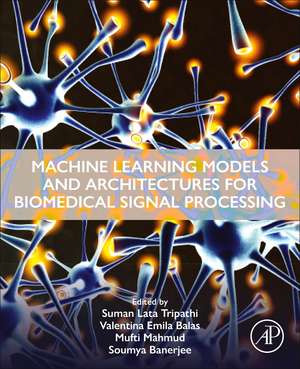Machine Learning Models and Architectures for Biomedical Signal Processing
Editat de Suman Lata Tripathi, Valentina Emilia Balas, Mufti Mahmud, Soumya Banerjeeen Limba Engleză Paperback – 8 noi 2024
- Covers the hardware architecture implementation of machine learning algorithms
- Discusses the software implementation approach and the efficient hardware of machine learning application with FPGA
- Presents the major design challenges and research potential in machine learning techniques
Preț: 704.17 lei
Preț vechi: 922.55 lei
-24% Nou
Puncte Express: 1056
Preț estimativ în valută:
134.81€ • 140.66$ • 113.00£
134.81€ • 140.66$ • 113.00£
Carte tipărită la comandă
Livrare economică 05-19 martie
Preluare comenzi: 021 569.72.76
Specificații
ISBN-13: 9780443221583
ISBN-10: 0443221588
Pagini: 614
Dimensiuni: 191 x 235 mm
Greutate: 0.45 kg
Editura: ELSEVIER SCIENCE
ISBN-10: 0443221588
Pagini: 614
Dimensiuni: 191 x 235 mm
Greutate: 0.45 kg
Editura: ELSEVIER SCIENCE
Cuprins
Section 1: Introduction to bioinformatics
1.1 Recent trends of bioinformatics
1.2 Biomedical signal processing technique
1.3 Transfer Learning based Arrhythmia classification using Electrocardiogram
Section 2: Machine learning models for biomedical signal processing
2.1 Exploring Machine Learning Models for Biomedical Signal Processing: A Comprehensive Review
2.2 Machine Learning for Audio Processing: From Feature Extraction to Model Selection
2.3 Pre-processing of MRI images suitable for Artificial Intelligence-based Alzheimer’s Disease classification
2.4 Machine Learning Models for Text and Image Processing
2.5 Assistive Technology for Neuro-rehabilitation Applications Using Machine Learning Techniques
2.6 Deep Learning Architectures in Computer Vision based Medical Imaging Applications with Emerging Challenges
2.7 Relevance of Artificial Intelligence, Machine Learning, and Biomedical Devices to Healthcare Quality and patient Outcomes
2.8 AI-Based ECG Signal processing applications
2.9 Deep Learning Approach for the Prediction of Skin Diseases
Section 3: Brain computer interfaces (BCI)
3.1 Brain-Computer Interface
3.2 Analysis on Types of Brain-Computer Interfaces for Disabled Person
3.3 Brain Computer Interfaces for elderly and disabled person
Section 4: Real time architecture design for biomedical signals
4.1 Machine learning model implementation with FPGA’S
4.2 Smart Biomedical Devices for Smart Healthcare
4.3 FPGA implementation for explainable machine learning and deep learning models to real time problems
Section 5: Software and Hardware-based Applications for biomedical Informatics
5.1 Software Applications for Biometric Informatics
5.2 Smart Medical Devices: Making Health Care More Intelligent
5.3 Security modules for biomedical signal processing
5.4 Artificial intelligence-based diagnostic tool for cardiovascular risk prediction
5.5 Machine Learning Algorithm approach in risk prediction of Liver Cancer
1.1 Recent trends of bioinformatics
1.2 Biomedical signal processing technique
1.3 Transfer Learning based Arrhythmia classification using Electrocardiogram
Section 2: Machine learning models for biomedical signal processing
2.1 Exploring Machine Learning Models for Biomedical Signal Processing: A Comprehensive Review
2.2 Machine Learning for Audio Processing: From Feature Extraction to Model Selection
2.3 Pre-processing of MRI images suitable for Artificial Intelligence-based Alzheimer’s Disease classification
2.4 Machine Learning Models for Text and Image Processing
2.5 Assistive Technology for Neuro-rehabilitation Applications Using Machine Learning Techniques
2.6 Deep Learning Architectures in Computer Vision based Medical Imaging Applications with Emerging Challenges
2.7 Relevance of Artificial Intelligence, Machine Learning, and Biomedical Devices to Healthcare Quality and patient Outcomes
2.8 AI-Based ECG Signal processing applications
2.9 Deep Learning Approach for the Prediction of Skin Diseases
Section 3: Brain computer interfaces (BCI)
3.1 Brain-Computer Interface
3.2 Analysis on Types of Brain-Computer Interfaces for Disabled Person
3.3 Brain Computer Interfaces for elderly and disabled person
Section 4: Real time architecture design for biomedical signals
4.1 Machine learning model implementation with FPGA’S
4.2 Smart Biomedical Devices for Smart Healthcare
4.3 FPGA implementation for explainable machine learning and deep learning models to real time problems
Section 5: Software and Hardware-based Applications for biomedical Informatics
5.1 Software Applications for Biometric Informatics
5.2 Smart Medical Devices: Making Health Care More Intelligent
5.3 Security modules for biomedical signal processing
5.4 Artificial intelligence-based diagnostic tool for cardiovascular risk prediction
5.5 Machine Learning Algorithm approach in risk prediction of Liver Cancer
